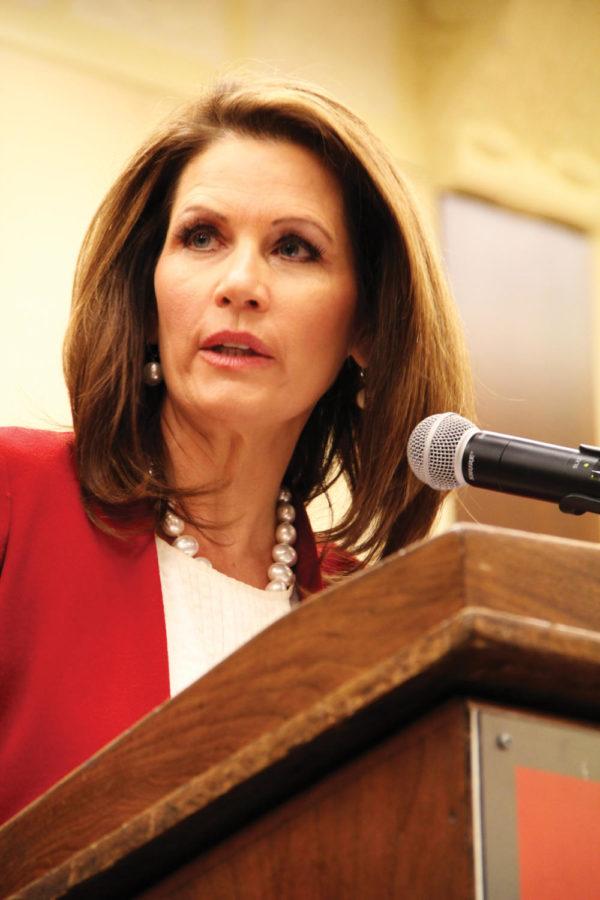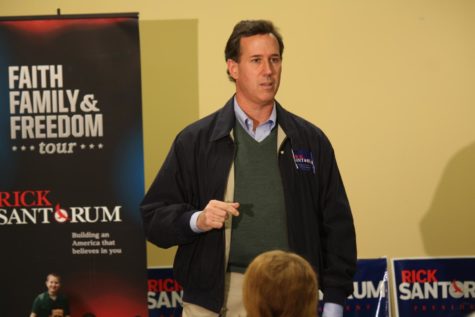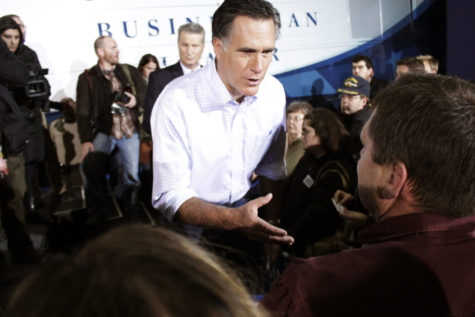Bachmann speaks about tax plan, economic state at Iowa State stop
Photo: Emily Harmon/Iowa State Daily
Michele Bachmann discusses the significance of economic policy to students’ futures and her presidential campaign platform at a town hall meeting Thursday, Nov. 3, at the Memorial Union. Bachmann is part of the Iowa State University Presidential Caucus Series.
November 3, 2011
Not one to shy away from the spotlight, Minnesota Sen. and Republican presidential hopeful Michele Bachmann hosted a town hall meeting on economic policy Thursday in the South Ballroom of the Memorial Union.
After a short introduction by the president of the ISU College Republicans, Bachmann was welcomed to the podium with an applause and began to lay out her discontent with the current economic state of the country and her plan to fix it.
Drawing on her experience as a former federal tax attorney, Bachmann said, “The problem is an individual tax code with 3.8 million words that’s too complicated for the average American to understand and a corporate tax code that makes America hopelessly uncompetitive at almost 40 percent when you add the federal and state taxes.”
Drawing heavily from her perception of the principles of the Founding Fathers, Bachmann stressed the importance of keeping the federal government as small as possible, stopping the overspending and devolving many agencies to state governments.
Additionally, Bachmann highlighted her proposed tax plan that she said, despite shying away from specifics, was based off of the tax plan under former President Ronald Reagan.
Bachmann then touched on the problem of politicians helping out their business donors, which is known as “Crony Capitalism,” and said how this practice must end.
“Politicians assure their friends that with the government’s financial backing, their businesses will never fail,” Bachmann said. “It happens every day, and it has to stop. After all, we’re not a Banana Republic; we’re the United States of America and we need to act.”
Later in her speech, after promoting the ideas of the Founding Fathers and their struggle against a tyrant as well as her promises to marginalize federal agencies like the National Labor Relations Board and the Department of Education, Bachmann touched on her plan to completely abolish the current federal tax code and replace it with a plan similar to former Reagan’s tax plan.
“In the 1980s, Ronald Reagan enacted tax reform that created a period of unparalleled prosperity,” Bachmann said. “I intend to increase our competitiveness by following his blue print for tax reform, which had as its core principle to stop taxing investment and productivity.”
Bachmann did not go into specifics on exact tax rates that her plan would entail, but she stressed that a main component of the plan would be that everyone in the country would pay a flat rate, regardless of income. Citing a statistic that 47 percent of Americans do not pay federal income taxes, which is because their yearly income is lower than the lowest tax bracket, Bachmann reiterated that these “people who pay nothing can easily forget the idea that there is no such thing as a free lunch.”
However, Bachmann continued to explain that those who can afford to pay more should pay more even if it is the same percentage of their income.
Bachmann ended her speech by mentioning that her new flat tax proposal was just part of her “American Jobs, Right Now” economic plan and that President Barack Obama was obstructing America’s ability to grow.
“The Obama way has brought economic misery,” Bachmann said. “As president of the United States, I am prepared to meet those challenges and do the hard work necessary to restore America to the economic leader it can be for you, your children and mine.”
After her speech, the congresswoman answered a number of questions from people in the audience ranging from issues of women’s safety to the minimum wage.
One question in particular from attendee Dylan Clark asked about Bachmann’s commitment to the President’s Emergency Plan for AIDS RELIEF, or PEPFAR, a program started under President George W. Bush to fight HIV and AIDS on a global scale.
In response, Bachmann said she supported PEPFAR, but also said, “our problem right now is overspending … but we have made substantial strides in that area [with PEPFAR].”
Later on, Clark’s fellow attendee Deepak Premkumar elaborated on the two’s mission to help promote PEPFAR by traveling around to talk to Republican candidates about it.
“Basically we are trying to lobby for more foreign aid for AIDS, tuberculosis and malaria,” Premkumar said. “And if Congresswoman Bachmann is elected president and she shows strong support for PEPFAR, it really could help.”
Zach Boss, an attendee of the town hall meeting, seemed to be very happy with the message Bachmann was pushing.
“I showed up because I just thought we needed to see a candidate that will represent fiscal change,” Boss said. “I thought her tax plan was good, but I don’t know if it’s the best one out there.”
Boss went on to say he is neutral on his support for a particular Republican candidate but appreciated the fact that Bachmann represented fiscal conservatism.
“I really like that [Bachmann] resembles the tea party movement much more than some of the candidates,” Boss said.
The event was presented as part of the Lecture Series at Iowa State and drew approximately 150 attendees and media personnel.









